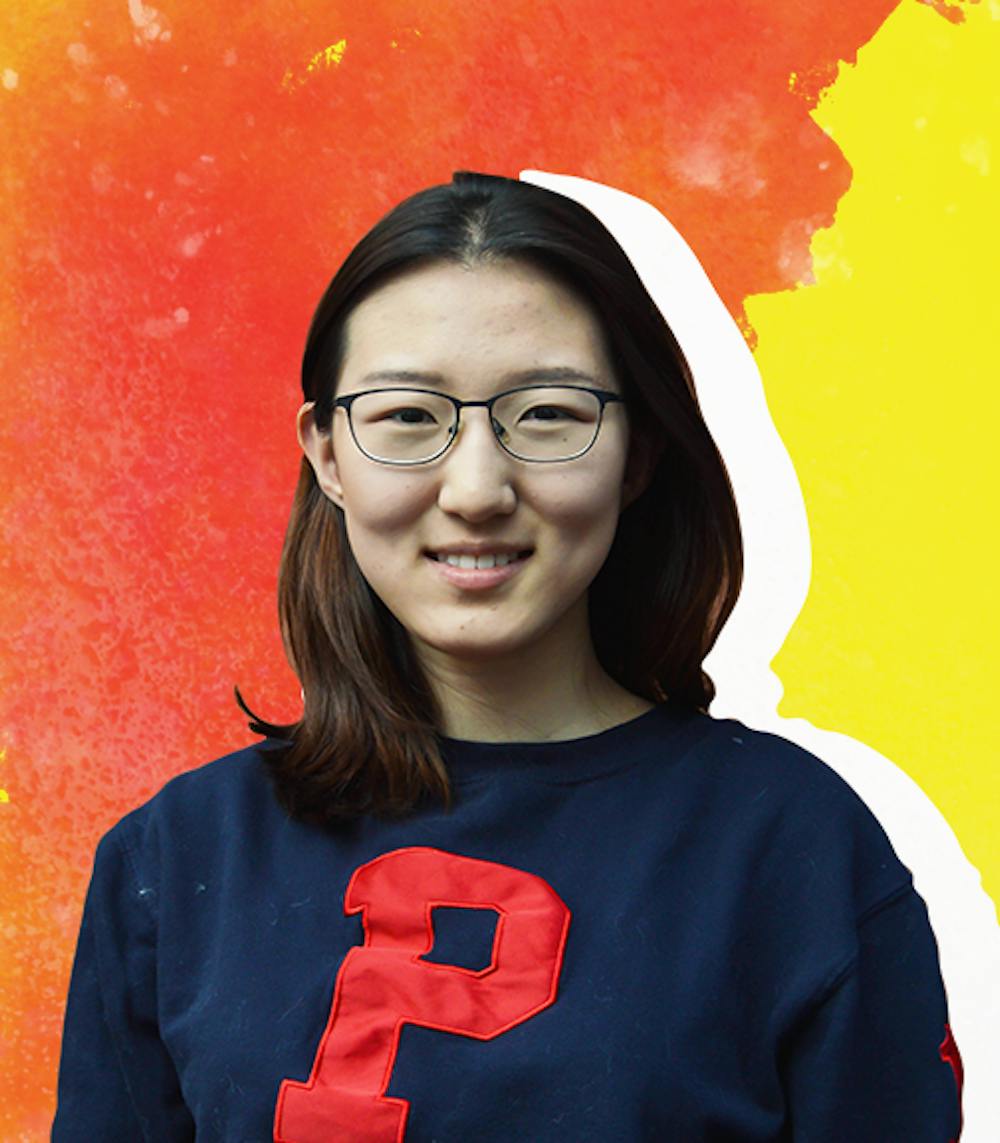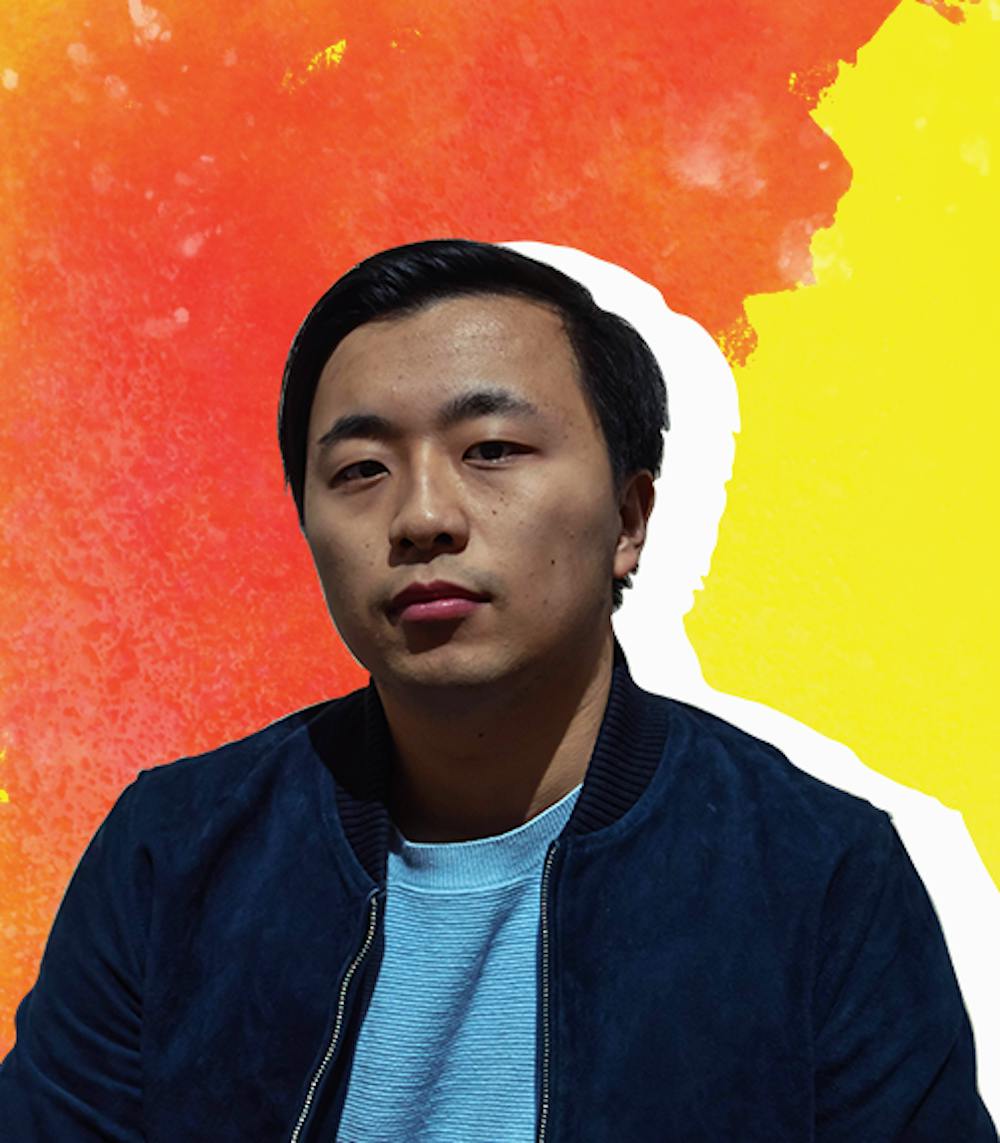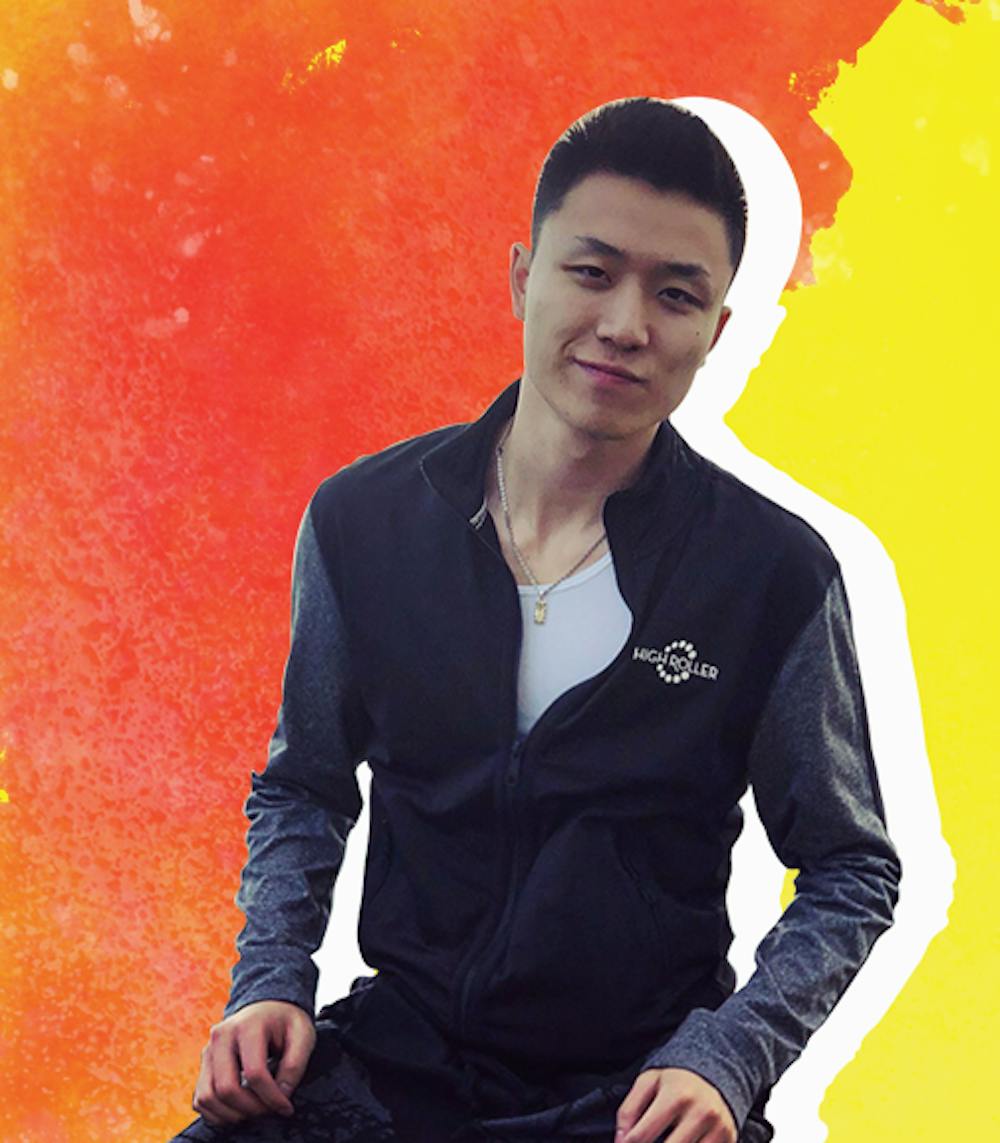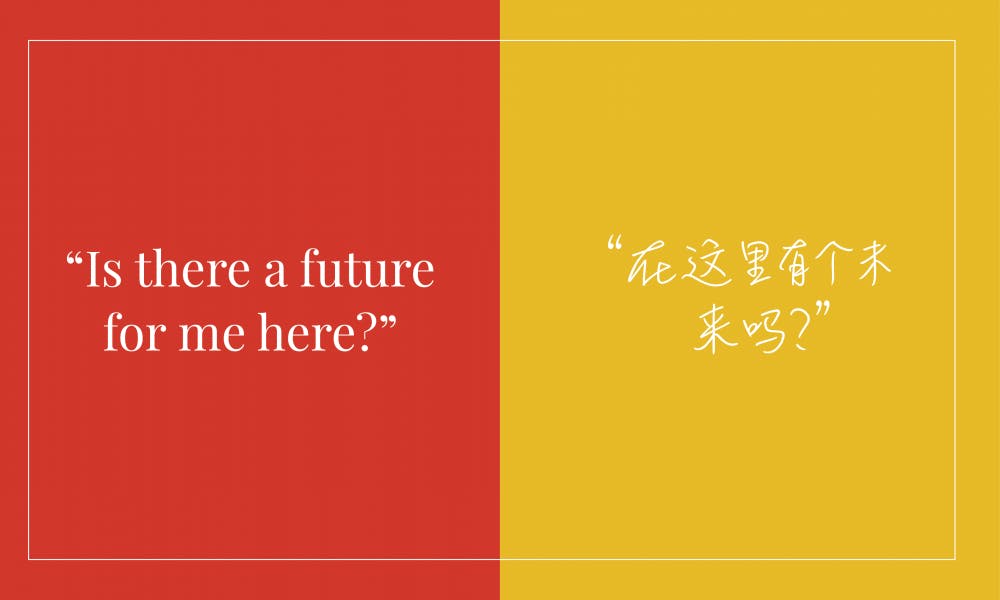After flying fifteen hours from Beijing to Philadelphia, Wendy Han (W' 19) was greeted in her freshman dorm in King’s Court with a uniquely American form of culture shock: football players. They made up at least half of her floor.
“They would just walk around naked,” Wendy said. “When I first arrived I was shocked.”
She found it difficult to befriend her hallmates, saying she made “maybe two friends.” She tried to connect with “ABCs” — American Born Chinese — but found cultural disconnect there, too.
“ABCs are totally different,” Wendy said. “I feel like sometimes you’re speaking English but you’re not speaking the same language.”
Even so, Wendy became — and remains — best friends with her American–Chinese roommate, calling herself “lucky” to have her during freshman year.
“She helped me so much,” Wendy said. “I was struggling a lot, depression, all those issues, but she was always there supporting me.”
Of the roughly one million international students in the US, Chinese students make up around a third of them. Most pay the sticker price of the universities they attend, boosting profits significantly. In 2016, Chinese students added $11.4 billion to the American economy through tuition fees and expenses. But many struggle with life in the US, due to linguistic and cultural barriers as well as professional and academic pressures.
At Penn, where around 38% of international students are Chinese, the administration has taken some steps to ease the transition, like creating Mandarin–speaking support groups at CAPS. But some Chinese students question whether these programs do enough. Others say they don’t feel comfortable using them at all.
Wendy attended Beijing No. 4 High School, one of the most prestigious high schools in China that sends students to prestigious American schools like Harvard and Yale “every year.” In her sophomore year she committed to applying to the US for university — an irreversible choice. She moved from the local Chinese track to the American track, taking APs and SATs with around a fifth of her peers.

Wharton junior Wendy Han.
“[My parents] kind of made the decision for me,” Wendy laughed. “It’s a middle class thing. If you’re middle class you want to send your kids abroad, if you have the connections and resources for that.”
Wendy, who started as a political science major in the College before transferring to Wharton, joined the Polybian Society, the social branch of Penn’s Government and Politics Association, in her freshman year. She distinctly remembers, at one Polybian event, being asked by a student from Washington D.C. what it was like living in her politically high–profile hometown of Beijing.
“That’s the first time I felt like someone valued my opinion and wanted to hear about my story,” Wendy said.
Despite that “valuable” encounter, Wendy lost interest in politics, in part because she feared a political science degree would not open enough doors for her professionally. She refocused her energy, transferring to Wharton and dropping out of Polybian to concentrate on recruiting.
“They were very acceptive,” Wendy said. “I think it’s on my end.”

Avery Goldstein, a Political Science and International Relations Professor and Director of the Center for the Study of Contemporary China at Penn, said he’s seen the number of Chinese students shoot up since he started teaching at Penn in 1985.
“It’s a combination of those things, the opportunity [to go abroad] but also the ability of Chinese parents to pay for this,” Goldstein said. “There’s an increasing number of Chinese who can afford to pay to send their students to American universities where they’re gonna have to foot pretty steep tuition bills.”
As non–Americans, most Chinese students are paying full tuition at Penn, and so by nature tend to be “well–off," which has led to “a stereotypical view” of Chinese students at Penn, according to Shanghai native Olly Liu (C'18).
“I think part of it is because we’re single child,” Olly said. He added, laughing, “I think we’re a little bit spoiled in that sense — every resource [goes] over to you.”

College senior Olly Liu.
First–year Graduate School of Education student Juliette Zhu, who hails from Hangzhou, China, is writing her thesis on the effect that studying abroad has on Chinese students’ psychological well–being. Through her thesis research, she learned that around 85% of international students do not have a single American friend. She says she’s observed this in her own life, too.
“Most of my Chinese friends don’t really have American friends here, even though they study at an American institution and are surrounded by Americans,” Juliette said. “First there’s the language barrier — although they can handle academic stuff, daily English is quite difficult for them, and slang.”
Olly thinks that Chinese and American students have different standards of what constitutes friendship: the Chinese definition is “just more intimate than Americans’ definition," and requires much more of a time commitment.
“I think a lot of Chinese don’t feel like they have American friends,” Olly said. “The Americans do view them as friends, but in Chinese standards they’re not really close.”
Olly thinks that the perception of Chinese students as a wealthy, insular group is “potentially” a barrier between them and American students. He also thinks that Americans have a “different party culture” that involves pregaming and going to parties, while many Chinese students would rather eat dinner together and go to karaoke afterwards.
In some cases, Olly says, the Penn Chinese community has created groups and events that are socially analogous to American ones, which can help fill the cultural element that mainstream Penn social life lacks. The Wharton China Association, for example, is the main social extracurricular group for Chinese undergraduates at Penn. Olly was president of WCA in his sophomore year and Wendy was VP of Internal in her sophomore year.
“In China we don’t have frat culture, but this is basically like our family or frat,” Olly explained. “If you’re from China and you haven’t adjusted to American culture, you get to hang out with people from your own country where you feel most like home.”
WCA’s most popular social event is the annual “dating show”, based on a popular mainland Chinese dating game show. Olly says the WCA event usually attracts 400–500 people, a number that includes most of Penn’s Chinese undergraduates, as well as graduate students, and sometimes Koreans and Chinese–Americans.
In the lead–up to the dating show’s final event, WCA releases trailers where participants introduce themselves and describe their ideal match. On the actual day, the participants — a group of female students and a group of male students — stand on stage and go through rounds of questions, choosing potential partners and eliminating others until they find their match. The event is conducted entirely in Mandarin — a high bar for any other interested students to breach.

Olly explained that most students don’t participate to actually find a date, but just to see their friends on stage, meet new people, and get a dose of familiar Chinese pop culture.
“It connects people. It’s also a fun thing to watch. It’s the most popular thing among the Chinese community,” Olly said, adding laughingly that “it’s kind of like, I don’t know, Spring Fling for us.”
Olly thinks that adapting more to one another’s preferred social practices would be an effective way to bridge the divide between Americans and Chinese.
“Parents spend so much money for their kids to know American culture,” he said. Olly suggests that American students could try throwing a “hotpot-themed party” and Chinese students could reach out to their American peers to grab a beer.
He added that while cultural groups are important, Chinese students shouldn’t “ignore” the culture of the country they’re in.
Olly says he’s comfortable in both Chinese and American social groups. He went to boarding school in Massachusetts for high school, which helped him “get to know American culture earlier.” Even so, he remains tethered to some Chinese social practices.
“I feel like I need Chinese friends, otherwise I’d be left out,” he said. “I’d rather be left out of American society than be left out of Chinese society, if I had to choose. But obviously there shouldn’t be [a choice].”
Juliette said that while language barriers usually subside — “most students get better as they live here longer” — cultural barriers often remain.
One “very significant” cultural barrier is the “racial illiteracy” among many Chinese international students who come to the US. Because China is relatively racially homogenous, Juliette explained, students arrive with little knowledge about race and racism, especially in the American context.
“After getting here they have to deal with people of different racial backgrounds,” Juliette said. “They don’t know how to talk to them, and they have fears, and this kind of fear and unfamiliarity really restricts their relationships with their peers and faculty.”
When Juliette was an undergraduate at Agnes Scott College in Georgia, she and some of her Chinese friends discussed issues they were “afraid to ask” about, like why race was so important in American discourse and whether “black” or “African–American” was a more appropriate term to use.
David Zhao (W' 19) avoided a lot of these barriers, at least by the time he got to Penn. David, a naturalized American citizen who describes himself as “half–international,” was born in Shanghai, where he lived before moving to New York when he was 11.
“[I spoke] zero English,” David said. “Very, very poor English. Like, I could say my name, probably.”
He was immersed in an American elementary school, which forced him to pick up English and gave him a crash course in American, too.

Wharton junior David Zhao.
“I’m very happy I was able to come earlier so that I could learn the language — not just for exams and academic English, but also to be able to interact and kind of be more adjusted to American culture,” David said.
David returns to China at least once a year to see his parents and grandparents, with whom he converses exclusively in Mandarin. He stays in touch with his Chinese primary school friends, often meeting with them in New York and Boston as well as Shanghai.
When he came to Penn, David sampled different clubs, but never any cultural interest groups. He pushes himself to leave his cultural comfort zone, which means he’s often “the only Chinese guy, or one of the few Chinese guys” in the room.
“I think for Chinese international students, whether it’s to join Greek life or join a club, there’s no barrier, so everybody can join as long as they’re open to it,” he said.
Juliette does not share David’s view that “there’s no barrier” between Chinese and American students. She thinks universities should educate both international and domestic students to be more open to other cultures.
“International students in general have been the population with the least attention from administrators, but this population has increased dramatically over the decades, especially Chinese international students,” Juliette said. “I really think the administrators, school, faculty, and staff should really pay attention to this population and learn how to get along with them and how to help them.”

First–year Graduate School of Education student Juliette Zhu.
Juliette is worried that existing programs don’t do enough to help connect Chinese students to the resources available to them at Penn, not necessarily due to lack of awareness, but because some Chinese students are too “shy” to initiate interactions.
“Lots of students, they don’t even know how to reach out to those other resources on campus, including the counseling service,” Juliette said. “So when they find life is frustrating and get really stressed out, they don’t know how to talk to a therapist.”
When Wendy was struggling in her freshman year, she thought about going to CAPS, but didn’t feel comfortable with the idea of “talking to strangers, even if they are professional.”
CAPS International Specialist Dr. Yuhong He said in an emailed statement that Chinese international students often struggle with a “lack of culturally sensitive support services from in and outside of campus.” Dr. He added that CAPS has been “actively employing different strategies to specifically reach out to Chinese international students.”
In addition to orientation workshops for all international students, CAPS has Chinese student–specific programming like publishing a Mandarin language CAPS brochure and hosting workshops with the Chinese Student and Scholar Association at Penn.
Director of International Student and Scholar Services (ISSS) Rodolfo Altamirano thinks that Penn has come a long way in outreach to international students since he arrived in 2006, when ISSS essentially functioned as an immigration office for Penn’s international population.
“We have to be cognizant that international students have specific needs compared to domestic students,” Altamirano, a former international student himself, said.

During his time here, Altamirano has launched initiatives such as Forerunner, a pre–freshman orientation for admitted students from China and India — Penn’s first and second largest international student populations — hosted in Beijing and New Delhi every summer, which CAPS is also a part of.
This year, Wendy dropped the few Wharton clubs she was in to focus on recruiting, citing the intense pressure on many Chinese students to secure “very high–paying jobs” that guarantee returns on their parents’ investment in their degrees.
“Some people criticize Chinese internationals because all of them are in finance and consulting,” Wendy said. “But otherwise you can’t really justify your education.”
Dr. He, the CAPS International Specialist, listed “performance pressure” and “complicated career decision making process[es]” as two of the many reasons that Chinese international students sometimes struggle to adjust to Penn and the US.
One of the reasons Wendy was drawn to Penn was its reputation for sending its graduates to those coveted Wall Street positions.
“To some extent I’m very appreciative,” Wendy said. “I wanted a practical professional education, rather than too ‘liberal arts.' I applied because this is what I [wanted], and then I got it, so I guess I should be satisfied.”
The problem remains, then, that she doesn’t know if she is. Sitting in Starbucks with a cup of coffee in her hands, wearing a white Penn baseball cap, half her face obscured by a surgical mask to fend off the circulating flu, Wendy could not come to a conclusion about her happiness.
She described the paradox of missing China, but then returning home and missing her friends in Philadelphia. She goes back to Beijing at least once a year, but the time at home is never long enough for her to feel fully “at home” again.
“When I was a freshman I thought of my Penn life as a bubble that would break at some point, and my true life was in Beijing,” she said. “But now whenever I’m in Beijing I’m like, ‘Yeah, my friends are in Penn and that’s where I live,' so I feel like the short break I have in Beijing is like a bubble now.”
Even though Wendy has made close friends at Penn and feels more settled than when she was a freshman in King’s Court, she questions whether it was worth leaving China in the first place.
“Now, I sort of don’t understand why I came to the States,” she admitted. “Is it for the education, is it for the experience? If I go back to China in the end, does this really matter? And if I decide to stay, then is there a future for me?”
Naomi Elegant is a junior from Kuala Lumpur, Malaysia studying History. She is a Features Staff Writer for Street and a Graduate Student & Alumni Beat for the DP.

